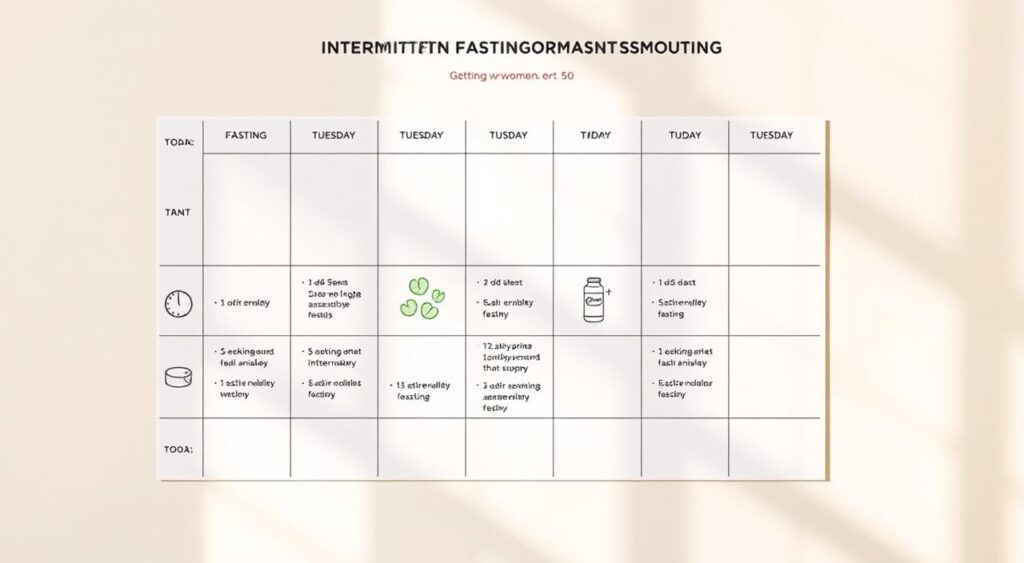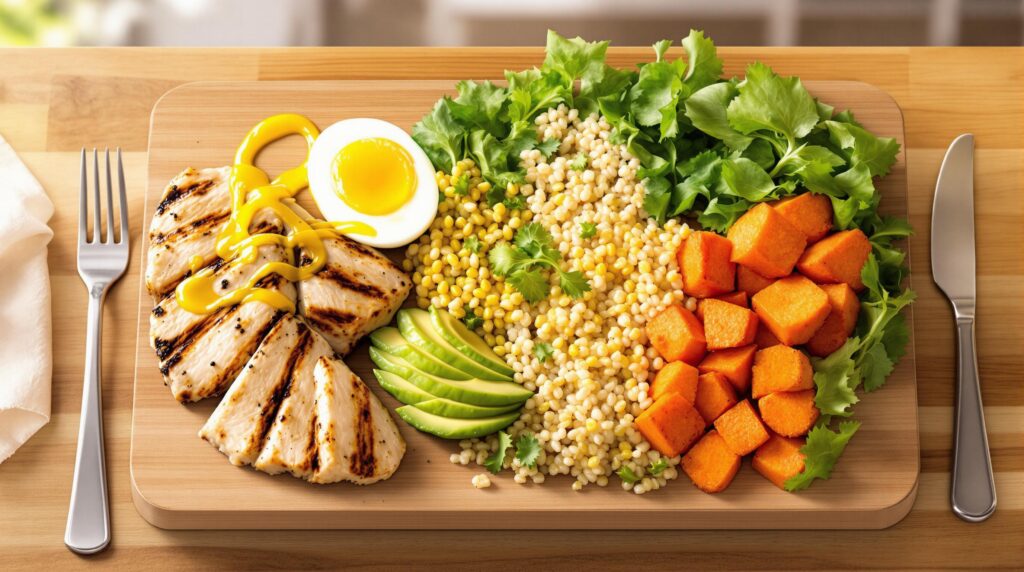Ever thought a simple change in eating could boost your health and energy after 50? Intermittent fasting (IF) is more than a diet. It’s a flexible way that could bring lasting benefits to women over 50. As your metabolism slows and health issues grow, learning how to start IF can help you control your wellness journey.
This guide is here to give you key tips for starting intermittent fasting as a woman over 50. It aims to make this journey easy and confident for you. Let’s dive into the amazing benefits of IF for women over 50 together.
What is Intermittent Fasting?
Intermittent fasting is a way to eat where you alternate between eating and fasting. It focuses on when you eat, not what. Studies show it can help with weight management and improve health.
The Basics of Intermittent Fasting
What is intermittent fasting? It’s about switching between eating and fasting. Your body can handle longer times without food. This makes it a good choice for many.
Different Types of Intermittent Fasting
There are many different types of intermittent fasting. Each fits different lifestyles. Here are a few:
- 16/8 Method: Fast for 16 hours, eat in an 8-hour window.
- 5:2 Diet: Eat normally for five days, then eat very little for two days.
- Alternate-Day Fasting: Fast every other day, mixing eating and fasting days.
Who Can Benefit from Intermittent Fasting?
Many people can benefit from intermittent fasting. It’s great for those trying to lose weight or improve health. It’s also good for people over 50 who want to stay healthy but are busy. For more info, check out this resource.
Why Intermittent Fasting is Ideal for Women Over 50
Intermittent fasting is great for women over 50. It helps with the changes aging brings, like hormone shifts and slower metabolism. Many women find it helps with weight loss too.
Benefits for Weight Management
Knowing the benefits of intermittent fasting for women over 50 is key. It’s important to keep a healthy weight as you age. This method helps you control calories and lose fat while keeping muscle.
It can also boost your metabolism, a big plus for women in their 50s.
Hormonal Balance in Your 50s
Hormonal changes can affect your health in your 50s. Intermittent fasting can help manage these changes. It may even ease menopause symptoms.
Some research shows it can improve hormonal balance. This can lead to better mood and energy.
Improving Metabolism and Energy Levels
Energy levels can drop as metabolism slows with age. Intermittent fasting helps your body use fat for energy. This can make you feel more energetic all day.
By sticking to a fasting schedule, you can boost your metabolism. This supports your health goals. For more on this, check out intermittent fasting benefits.

Getting Started with Intermittent Fasting
Starting intermittent fasting can seem daunting, but it offers many benefits. Finding the right schedule for women over 50 is key. It should fit your lifestyle and goals. Taking it one step at a time makes the transition easier.
Choosing Your Fasting Schedule
Choosing a fasting schedule that fits your daily life is important. Options like the 16:8 method, fasting for 16 hours and eating for 8, are popular. The 5:2 method, eating normally for five days and limiting calories on two days, is another choice. Pick what works best for you to reach your health goals.
Setting Realistic Goals
Setting achievable goals is motivating. Aim for better energy or overall well-being, not just quick weight loss. Small, reachable goals will keep you motivated. This guide is a great resource for women over 50 starting intermittent fasting.
Preparing Mentally and Physically
Mental preparation is just as important as physical. You might feel hungry or crave food at first. Focus on eating nutrient-dense foods during your eating times to stay energized and healthy. Remember, it takes time to adjust, and patience is essential for success.

| Fasting Schedule | Description | Best For |
|---|---|---|
| 16:8 | Fast for 16 hours, eat during 8 hours | Individuals seeking a balanced routine |
| 5:2 | Normal eating for 5 days, limited calories for 2 days | Those aiming for weight loss with flexibility |
| Alternate Day Fasting | Fast every other day, eat normally on non-fasting days | Experienced fasters looking for significant results |
What to Eat During Your Eating Window
When you’re on an intermittent fasting meal plan, it’s key to choose wisely. Focus on foods that are good for you. These foods should help keep you healthy and happy.
Focus on Nutrient-Dense Foods
Make sure to eat whole grains, lean proteins, healthy fats, and lots of fruits and vegetables. This mix will give you the nutrients you need. Here’s a list of foods you should include:
| Food Group | Examples | Nutritional Benefits |
|---|---|---|
| Whole Grains | Quinoa, Brown Rice, Oats | Rich in fiber, helps regulate digestion |
| Lean Proteins | Chicken, Fish, Lentils | Aids in muscle retention and supports metabolism |
| Healthy Fats | Avocados, Nuts, Olive Oil | Provides essential fatty acids, supports heart health |
| Fruits & Vegetables | Spinach, Berries, Broccoli | Packed with vitamins, minerals, and antioxidants |
Hydration: The Importance of Water
Drinking enough water is vital for your health. It helps with digestion and can curb hunger. Try herbal teas or black coffee for flavor without extra calories.
Meal Planning Tips for Success
Meal planning can make sticking to your diet easier. Here are some tips to help:
- Batch cook meals over the weekend to save time during the week.
- Utilize a meal prep service if cooking becomes time-consuming.
- Create a weekly menu to help stay focused on your nutrient-dense goals.
- Ensure you always have healthy snacks available to avoid impulsive eating.
Common Challenges and How to Overcome Them
Starting intermittent fasting can be tough, mainly adjusting to new habits. It’s key to know common problems and how to solve them. Here are some tips to help you stick with intermittent fasting for women over 50.
Dealing with Hunger Pangs
Feeling hungry during fasting is normal. Here are ways to fight those hunger pangs:
- Drink lots of water to stay hydrated.
- Try herbal teas for comfort and fullness.
- Do light activities to take your mind off hunger.
Managing Social Obligations
Social events can mess up your fasting plan. Here’s how to handle them:
- Adjust your fasting times to fit social plans.
- Tell your friends and family about your fasting to get their support.
- Bring healthy food to share, so you have options that fit your diet.
Staying Motivated on Your Journey
Keeping motivated is key for success. Having a support system helps a lot:
- Join online groups for women over 50 fasting.
- Keep a journal to track your progress and celebrate wins.
- Recognize and celebrate small victories to stay committed.

By tackling these challenges, you can fully enjoy the benefits of intermittent fasting.
Safety Considerations for Women Over 50
When thinking about intermittent fasting for women over 50, your health comes first. Big changes in how you eat can affect your health. Being informed and proactive helps keep your fasting journey safe and good for you.
Consulting with a Healthcare Professional
Always talk to a doctor before starting any fasting plan. This is important to discuss any health issues or medicines that might affect fasting. Your doctor can give advice that fits your health, making sure fasting is safe for you.
Recognizing Warning Signs
It’s key to know how your body reacts. Look out for signs like:
- Severe fatigue
- Frequent headaches
- Unusual cravings
Heeding these signs helps keep you safe while fasting. If you notice any, talk to your doctor to get help and advice.
Modifications for Preexisting Conditions
People with certain health issues need special care when fasting. For example, those with diabetes or thyroid problems might need to adjust their fasting plan. Working with a doctor helps make a fasting plan that’s right for you, keeping you healthy and happy.

Success Stories from Women Over 50
Real-life success stories can really motivate you if you’re thinking about intermittent fasting. Women over 50 have shared their experiences. They’ve seen weight loss and big health improvements. Their stories show how fasting can change your life.
Inspirational Transformations
Many women have seen big changes in their health and life through fasting. Their stories often include:
- Less body weight and smaller waist
- More energy all day
- Better blood pressure
- Clearer mind and focus
But it’s not just about the body. Women also talk about better sleep and emotional health. These changes make a big difference in their lives.
Key Takeaways from Their Experiences
Learning from these women can help you on your fasting journey. They share important lessons like:
- Finding a Sustainable Schedule: It’s key to pick a fasting plan that works with your life.
- Prioritizing Nutrient-Dense Foods: Eating whole, nutrient-rich foods during your eating times is important.
- Understanding Individual Responses: Everyone reacts differently to fasting. Listen to your body to find what works best for you.
These lessons come from the experiences of many women over 50 who have tried fasting. Their stories are a great source of inspiration for your own fasting journey.
Tracking Your Progress
Keeping a record of your journey is key when starting intermittent fasting. It helps you see what works for your body and lifestyle. Using tech and old-school methods can make tracking easier and support your goals.
Using Apps and Journals
Apps for intermittent fasting make tracking easier. They let you log your fasting and eating times. Adding journaling can give you deeper insights that apps might not.
A journal adds a personal touch. It lets you record your thoughts, energy, and cravings. This adds emotional depth to your physical achievements.
Celebrating Small Victories
Every small win is important! Feeling more energetic, losing weight, or sticking to your fasting plan are all victories. Celebrating these boosts your motivation.
It shows that every step counts. It keeps you committed to tracking your progress for women over 50.
Adjusting Your Plan as Needed
It’s important to regularly check if your plan is working. Adjust your fasting schedule based on how you feel and respond. If something’s not working, change it.
Being flexible helps you tailor your journey. It keeps you on track with tracking intermittent fasting progress for women over 50.
Long-Term Sustainability of Intermittent Fasting
To make intermittent fasting work for women over 50, find a routine that fits your life. Adjust your fasting times for busy days or special events. The goal is to make fasting a part of your life that improves your health, not adds stress.
Making Intermittent Fasting a Lifestyle
Choosing intermittent fasting as a lifestyle means finding what works for you. Adding exercise and mindfulness can boost fasting’s benefits. This approach helps you stay committed to your health, making the most of this important life stage.
Combining with Other Healthy Habits
Pairing intermittent fasting with healthy habits is key for the best results. Eat a balanced diet, drink plenty of water, and learn about nutrition. This knowledge helps you stick to fasting for the long haul. For more tips, check out trusted resources that support your journey.
Reinforcing Your Commitment to Health
Staying committed to health means always learning and staying informed. Knowing how to handle challenges helps you keep up with fasting. A strong foundation in health and wellness will help you thrive in your 50s and beyond.




Pingback: Meal‑replacement shake that’s helping women drop 20 lbs
Pingback: Science-Backed Benefits of Intermittent Fasting: From Brain Health to Weight Loss
Pingback: Reverse Dieting: Fix Your Metabolism After Long Deficits
Pingback: How to Stop Weekend Overeating Without Feeling Deprived